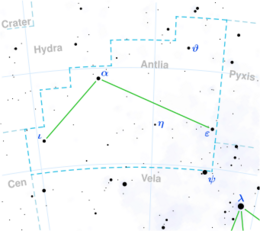Astronomy:HD 93905
| Observation data Equinox J2000.0]] (ICRS) | |
|---|---|
| Constellation | Antlia |
| Right ascension | 10h 49m 57.0188s[1] |
| Declination | −34° 03′ 29.4506″[1] |
| Apparent magnitude (V) | 5.61[2] |
| Characteristics | |
| Evolutionary stage | main sequence[3] |
| Spectral type | A1 V[4] |
| U−B color index | +0.05[5] |
| B−V color index | +0.04[5] |
| Astrometry | |
| Radial velocity (Rv) | −9.5±1.3[6] km/s |
| Proper motion (μ) | RA: −41.069[1] mas/yr Dec.: +5.845[1] mas/yr |
| Parallax (π) | 8.7989 ± 0.1617[1] mas |
| Distance | 371 ± 7 ly (114 ± 2 pc) |
| Absolute magnitude (MV) | 0.00[2] |
| Details[3] | |
| Mass | 2.78±0.05 M☉ |
| Radius | 3.89[7] R☉ |
| Luminosity | 101±9 L☉ |
| Surface gravity (log g) | 3.77[8] cgs |
| Temperature | 8995+125 −123 K |
| Rotational velocity (v sin i) | 85[9] km/s |
| Age | 256±6 Myr |
| Other designations | |
| Database references | |
| SIMBAD | data |
HD 93905 (HR 4238) is a solitary star located in the southern constellation Antlia. The star has an absolute magnitude of 0[2] and an apparent magnitude of 5.61,[2] making it faintly visible to the naked eye under ideal conditions. The star is located 371 light years[1] away based on its parallax shift and is drifting closer with a helocentric radial velocity of −9.6 km/s.[6]
This star has a classification of A1 V,[4] which indicates that it is an ordinary A-type main-sequence star that is fusing hydrogen at its core. At present it has 2.78[3] times the mass of the Sun but is large and over luminous for its class with 3.89[7] times and 101[3] times the radius and luminosity of the Sun respectively. This is because HD 93905 has already completed most of its main sequence lifetime at an age of 256 million years.[3] HD 93905 has a surface temperature of 8,895 K[3] and spins quickly with a projected rotational velocity of 85 km/s.[9]
References
- ↑ 1.0 1.1 1.2 1.3 1.4 1.5 Brown, A. G. A. (August 2018). "Gaia Data Release 2: Summary of the contents and survey properties". Astronomy & Astrophysics 616: A1. doi:10.1051/0004-6361/201833051. Bibcode: 2018A&A...616A...1G. Gaia DR2 record for this source at VizieR.
- ↑ 2.0 2.1 2.2 2.3 Anderson, E.; Francis, Ch. (May 2012). "XHIP: An extended hipparcos compilation". Astronomy Letters 38 (5): 331–346. doi:10.1134/S1063773712050015. ISSN 1063-7737. Bibcode: 2012AstL...38..331A.
- ↑ 3.0 3.1 3.2 3.3 3.4 3.5 Zorec, J.; Royer, F. (January 2012). "Rotational velocities of A-type stars: IV. Evolution of rotational velocities". Astronomy & Astrophysics 537: A120. doi:10.1051/0004-6361/201117691. ISSN 0004-6361. Bibcode: 2012A&A...537A.120Z.
- ↑ 4.0 4.1 Houk, N. (1982). Michigan Catalogue of Two-dimensional Spectral Types for the HD stars. Volume_3. Declinations -40_ƒ0 to -26_ƒ0.. Bibcode: 1982mcts.book.....H.
- ↑ 5.0 5.1 Johnson, H. L.; Mitchell, R. I.; Iriarte, B.; Wisniewski, W. Z. (1966). "UBVRIJKL Photometry of the Bright Stars". Communications of the Lunar and Planetary Laboratory 4: 99–110. Bibcode: 1966CoLPL...4...99J.
- ↑ 6.0 6.1 Gontcharov, G. A. (November 2006). "Pulkovo Compilation of Radial Velocities for 35 495 Hipparcos stars in a common system". Astronomy Letters 32 (11): 759–771. doi:10.1134/S1063773706110065. ISSN 1063-7737. Bibcode: 2006AstL...32..759G.
- ↑ 7.0 7.1 McDonald, I.; Zijlstra, A. A.; Watson, R. A. (11 October 2017). "Fundamental parameters and infrared excesses of Tycho–Gaia stars". Monthly Notices of the Royal Astronomical Society 471 (1): 770–791. doi:10.1093/mnras/stx1433. ISSN 0035-8711. Bibcode: 2017MNRAS.471..770M.
- ↑ Anders, F. et al. (August 2019). "Photo-astrometric distances, extinctions, and astrophysical parameters for Gaia DR2 stars brighter than G = 18". Astronomy & Astrophysics 628: A94. doi:10.1051/0004-6361/201935765. ISSN 0004-6361. Bibcode: 2019A&A...628A..94A.
- ↑ 9.0 9.1 Royer, F.; Zorec, J.; Gómez, A. E. (February 2007). "Rotational velocities of A-type stars: III. Velocity distributions". Astronomy & Astrophysics 463 (2): 671–682. doi:10.1051/0004-6361:20065224. ISSN 0004-6361. Bibcode: 2007A&A...463..671R.
 |

